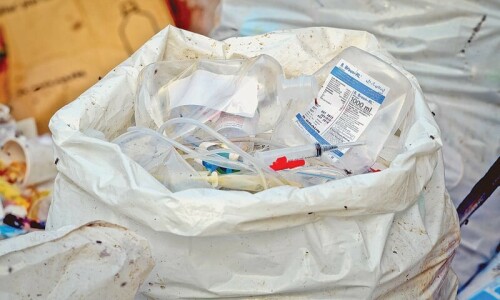ISLAMABAD: Highlighting that plastic pollution is a regional problem in South Asia, a newly released World Bank report blames six countries of the region for facilitating the transport of pollution across borders such as solid waste including plastics, industrial effluents, domestic wastewater and microplastics through 20 major rivers.
Besides rivers and other cross-border environmental issues like air pollution, these countries share similar socioeconomic and solid waste sectoral challenges.
The two major transboundary river basins, Ganges-Brahmaputra Meghna (GBM, that includes Bangladesh, Bhutan, India, and Nepal) and the Indus River basin (including Afghanistan, India, and Pakistan) are highlighted due to their high leakage rates.
Across South Asia, plastics, particularly single-use plastics leak into the environment including rivers, streams, and drains due to insufficient waste management systems. There are major constraints all along the waste value chain, from poor waste collection and segregation, to lack of recycling and recovery systems, to improper waste disposal and processing sites.
Report says countries lack coordination to cut plastic consumption
While poor waste management affects all types of wastes, plastics are particularly problematic owing to their durability and light weight.
The report, “Waves of Plastics: A Snapshot of Marine Plastic Pollution in South Asia”, sought to establish a comprehensive baseline of plastic waste flow into water bodies in the region and aims to support the formulation of evidence-based policies and strategies for plastic pollution reduction and a transition toward a regional circular economy framework for plastics.
The report stated the rapid growth in both population and industrial sectors has led to highly populated areas becoming hotspots for plastic waste generation. Consequently, these epicenters become primary sources of plastic leakage into river systems.
These areas show far higher levels of plastic leakage compared to large areas across the region which correspond to rural areas.
According to the report, there is currently little focus on reducing plastic production and improving the collection, separation, and recycling of plastic waste.
While plastic consumption is low compared to more economically developed countries, it is increasing in the region.
While alternatives such as bioplastics are being proposed as a solution, there are no clear standards or guidelines available.
The report pointed out that the region’s high mismanaged plastic waste rate stems from inadequate focus on recyclability during the initial design phase of products, which contributes to the proliferation of single-use plastics with limited recycling potential.
The problem is exacerbated by inadequate infrastructure for waste collection services in urban and rural areas across the region.
In South Asia, the informal sector, comprising a network of waste pickers, small-scale recyclers, and local waste collectors, serves as the backbone of plastic waste management, especially in areas where formal infrastructure is lacking or insufficient.
While there are similarities in waste management and related policies across the region, there are variations in plastic production, manufacturing, and use among South Asian countries.
To reduce plastic waste leakage, interventions are needed along the entire value chain. South Asian countries lack coordination in reducing plastic consumption or managing specific plastic waste across the region.
While plastic waste and marine pollution have garnered increasing policy attention over the years, their implementation and enforcement remain poor due to various factors like inadequate enforcement, lack of implementation capacity, and limited public awareness. Effective policy implementation necessitates robust infrastructure, logistical support, strong leadership, and active participation from private and informal sectors, the report said.
Published in Dawn, September 2nd, 2024














































